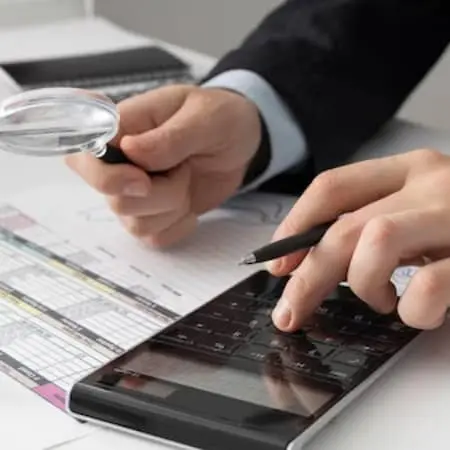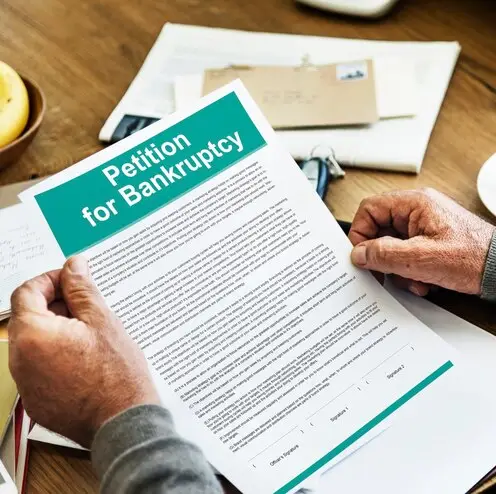Maine Chapter 7 Bankruptcy: A Path to Financial Relief
Significant debt can be overwhelming. As you struggle to stay financially afloat, with credit card bills, medical expenses, or other debts piling up, you often feel despair and hopelessness.
As a result, you may be considering Chapter 7 bankruptcy – or simply advice on navigating these challenges. Given the complexity of the law and the range of issues to consider, getting advice early on is crucial.
Several steps can be taken before matters have gone too far, and valuable assets are lost.
Contact VBK today to learn more.

You Know You Might Need to File If:
- You receive consistent collection calls
- The interest on your debts is such that you can’t pay them off
- Living paycheck to paycheck while paying credit cards and other debts is not possible
- You’re considering debt consolidation loans
- You fear losing your home or other assets
Although thinking about filing for Chapter 7 bankruptcy in Maine—let alone doing so—can feel daunting, the results may be comparable to hitting a reset button.
A fundamental goal of the federal bankruptcy laws enacted by Congress is to give debtors a financial ‘fresh start’ from burdensome debts. The Supreme Court made this point about the purpose of the bankruptcy law in a 1934 decision:
It gives to the honest but unfortunate debtor…a new opportunity in life and a clear field for future effort, unhampered by the pressure and discouragement of preexisting debt.
At VBK, our experienced bankruptcy attorney, Jim Munch (link to bio), offers over 20 years of bankruptcy experience. Jim has skillfully helped many families and individuals navigate the Chapter 7 bankruptcy process in Northern Maine.
Every client, like you, arrives with a personal story and unique circumstances. Jim is committed to helping you get back on solid financial ground.
Contact VBK to learn more.
Do's and Don'ts Before Filing Chapter 7
As you prepare to file for Chapter 7, there are certain steps you should and shouldn’t take:
Do
- Carefully disclose all assets, income, expenses, and debts to your attorney.
- Continue paying regular bills like rent/mortgage, utilities, etc.
- Use credit cards for essentials only.
- Hold onto financial records like pay stubs and bank statements.
Don’t
- Transfer assets out of your name or give them away.
- Take out new loans or accumulate significantly more debt.
- Pay back loans to family/friends over other creditors.
- Hide assets or lie about income/expenses.
- Ignore creditors.
What Is Chapter 7 Bankruptcy?
Chapter 7, also known as straight bankruptcy or liquidation bankruptcy, is designed for lower-income debtors who don’t have enough disposable income to repay debts through a repayment plan.
By filing for Chapter 7, you may be able to discharge (eliminate) qualifying unsecured debt (read: What is Unsecured Debt?), such as credit cards, medical bills, personal loans, and utility bills.
However, certain debts, such as student loans, alimony, and recent tax bills, can generally not be discharged (not eliminated).

The Chapter 7 Process in Maine
Filing for bankruptcy in Maine does involve some complexities. However, having a Chapter 7 bankruptcy attorney on your side may ensure a smooth and successful process.
Here’s an overview of what to expect:
Consultation
Jim will assess your financial situation and help you determine if Chapter 7 is the right option for you. If you decide to work together, he will explain the process, answer your questions, address your concerns, and work with you to gather all of the needed information for the bankruptcy filing.
Petition Filing
On your behalf, VBK would then prepare and file your Chapter 7 petition with the U.S. Bankruptcy Court in Maine.
The Meeting of Creditors
Jim or another attorney will be with you when you meet with the court-appointed trustee who oversees the case and with creditors who may have questions about your assets.
Asset Liquidation (if applicable)
Your non-exempt assets may be liquidated to pay creditors. However, Maine has specific exemption laws protecting your essential belongings, such as household furniture, a certain amount of equity in your car, and a portion of your home equity. Part of Jim’s work will be to maximize these exemptions for you.
Debt Discharge
The goal is issuing a discharge order, eliminating most unsecured debts, such as credit cards, medical bills, and personal loans.
Case Study: Rebuilding After Job Loss and Pandemic
Sarah is a single mother of two living in central Maine. She was working as a store clerk, and soon after the COVID-19 pandemic began, Sarah was laid off. She was already living paycheck-to-paycheck, and after losing her job, she depleted her small savings. Savings went to the essentials, such as rent, groceries, heat, and warm clothing for her growing children.
To get by, Sarah opened new credit cards. Even while living conservatively, she accumulated over $35,000 in credit card debt, which grew rapidly with the high interest rates charged by credit card companies.
Sarah did regain employment, but her new job paid less, and the cost of goods in her community suddenly increased. With two kids and no backup partner to help support the family, she quickly accepted that paying down her credit card debt was unrealistic. This realization was not easy and became increasingly difficult to bear.
Before deciding how to handle her crisis, she called a Chapter 7 bankruptcy attorney. After exploring her options with a lawyer, Sarah filed Chapter 7 bankruptcy. Also, on the advice of her attorney, she did not cash in her IRA—her retirement nest egg—because that was exempt. This means that it was not lost in the bankruptcy but survived the process so she could continue to build on that foundation for her retirement.
Several months after filing, Sarah received what is called a discharge, wiping out $45,000 in credit card balances and medical bills. While her bankruptcy impacted her credit score in the short term, it would rebound. Sarah no longer had to worry about her unmanageable debt and again focused on her earnings and providing for her children without the burden of creditors’ action. She was free to make economic decisions without fear that the fruits of her hard work would vanish in court. This ‘Fresh Start’ felt like a gift.
Sarah is slowly rebuilding her credit over time but without the burden of past debts.
Disclaimer
This content is for informational purposes only and does not constitute legal advice. Your specific circumstances may require the guidance of a licensed attorney. The outcome in the case study above is not guaranteed for everyone who files Chapter 7.
VBK Law: Your Maine Chapter 7 Bankruptcy Partner
Chapter 7 bankruptcy can be a powerful tool for regaining your financial freedom. At VBK Law, we understand the emotional and legal complexities.
When you choose to work with James Munch of VBK, you are in skilled, highly qualified hands. You’ll receive expert advice and a confident, knowledgeable guide.
Contact VBK Law today for a consultation and take the first step towards a sound financial future.
Bankruptcy Related

Collections
VBK has represented Maine businesses and business people for decades in business disputes. In particular we have assisted our clients
Meet The Expertise
Attorneys Practicing in Bankruptcy / Debt Relief

A small river named Duden flows by their place and supplies it with the necessary
- Phone:+1 (859) 254-6589
- Email:info@example.com
